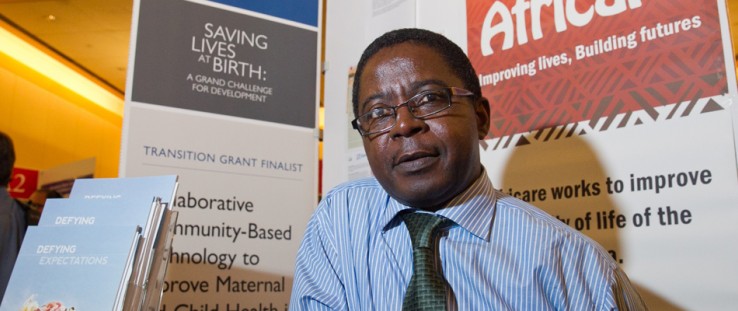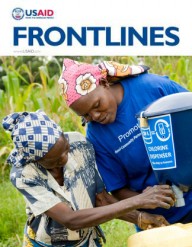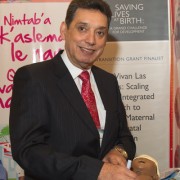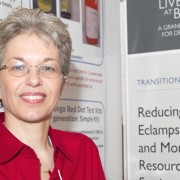 Christopher Mfornyam, of Africare, mans his organization's display at USAID's third Saving Lives at Birth event.
USAID
Christopher Mfornyam, of Africare, mans his organization's display at USAID's third Saving Lives at Birth event.
USAID
 Christopher Mfornyam, of Africare, mans his organization's display at USAID's third Saving Lives at Birth event.
USAID
Christopher Mfornyam, of Africare, mans his organization's display at USAID's third Saving Lives at Birth event.
USAID
In Senegal and much of West Africa, pregnant women rarely seek out prenatal care, not because they don’t want to deliver a healthy baby, but because of traditional beliefs that discourage them for disclosing a pregnancy in its early stages.
“We’re trying to address the culture,” says Dr. Nene Diallo, the deputy director of Africare’s Office of Health & HIV/AIDS who has spent 30 years in the medical field.
“What happens is they decide to go see the midwife or the nurse six or seven months into the pregnancy,” she says. “Sometimes they never go; there are many who never seek prenatal care. They have already other issues: they are small so they cannot deliver properly; they are anemic because they eat less and they work long hours. For any condition, traditionally, they seek local solutions first.
“It’s not until all that has failed that they decide to take this woman on a hammock to the health post. By the time they get there, this person at the health post doesn’t have much to deal with. If it’s complicated, (the patient) needs transfusion of blood, she needs C-section, she needs to go to the next level. That’s what is killing women. It is really, really tragic how many women are dying from child birth.”
In Senegal, 370 mothers die each year for every 100,000 live births—an extremely high rate of mortality.
For some women, the distance to travel to health centers, which can be anywhere from two hours to two days, discourages them from seeking care. For others, the cost is a problem. But, among the biggest barriers is a culture of secrecy that keeps expectant moms from speaking out until they can’t hide their bulging bellies.
The challenge has perplexed organizations for years despite best efforts to address it. But Africare thinks it has hit on a solution that takes some proven programs and ratchets them up with some old-fashioned mother’s wisdom and the modern innovations of mobile telephones and telemedicine. The Saving Lives grant will help them marry the various parts and try it on a larger scale.
The project will reach out to pregnant woman in five rural regions of Senegal who are early in the first trimester of their pregnancies and match them with older women mentors who belong to existing women’s circles. The mentors—many of whom have grown in confidence and stature in their communities through women’s circles, savings clubs and microfinance ventures sponsored by Africare—will be trained to help guide and advise expectant mothers.
Community health workers using mobile telephones will collect basic data about the women and transmit it to regional health centers where nurses and other skilled medical workers will tabulate the information. Now in the system, the pregnant women will be scheduled for prenatal visits that should allow for early detection of potential problems and timely referrals. And if a woman misses an appointment, she should expect to get a call or visit from a health worker.
Local midwives are also in the loop on who is pregnant through this project. The goal is that no one falls through the cracks.
“It’s all about removing all these barriers to accessing all these health services,” Diallo said. “If it’s because you don’t have money, you can have money from these (women’s) associations. If it’s because you have peer pressure, we’re addressing these through the behavior change modification. More than anything else … the challenge is how do we change behaviors. It’s very difficult. It takes time.”
Partnering with Africare are Dimagi, which is developing software that will be installed on mobile phones for community health workers to use as they input data on pregnant women, and the African Medical and Research Foundation, which is helping with a telemedicine platform that regional health centers will use to communicate with their local counterparts where pregnant women are most likely to seek care. This will be the first time telemedicine will be used large-scale in the country to address maternal health.
Another important, if unsung, partner: men.
“We have to involve the husbands,” Diallo said. “We have to involve the priests or the imam. Whoever is respected in these communities are part of the decision-making process. If you don’t involve them, you are wasting your time, basically.”
All told, the project hopes to reach more than 300,000 women in the Tamba, Ziguinchor, Kedougou, Sediou and Kaffrine regions. And, Diallo has a clear vision of how she wants the project to progress.
“What I want to see is what I saw with malaria,” said the pediatrician, who earlier in her career watched children die needlessly of the disease. The frustration prompted her to move into public health: “I was not seeing real impact on small things that are killing children—diarrhea, malaria. It’s not cancer. It’s not big things really. It’s something you can prevent. You have solutions.”
So when malaria deaths started dropping in Senegal and other countries, she was overjoyed. On a trip to the country seven years ago, a nurse there told her “we’re not getting complicated malaria cases at the health facility any more because of all the behavior change that is taking place at the communities. The communities are telling us that we know now it is the mosquitoes causing malaria and not witchcraft. This old man said ‘My village is getting crowded, children are not dying anymore.’
“You will not find anyone in Africa today who won’t tell you that bednets prevent malaria. It is that kind of thing I am hoping to see here, that they understand that the sooner you seek prenatal care, the more likely you are to survive childbirth. That’s my real dream for this project, for them to start understanding there’s nothing wrong with disclosing your pregnancy.”











Comment
Make a general inquiry or suggest an improvement.